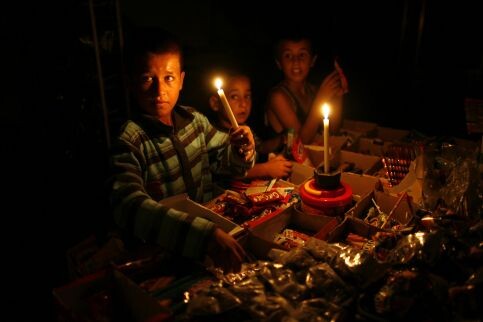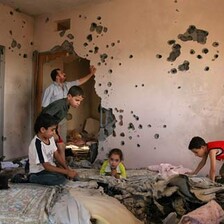The Electronic Intifada 6 September 2010

Children selling goods in Gaza. (Mohammed Omer/IPS)
GAZA CITY, occupied Gaza Strip (IPS) - The Muslim festival approaches, but not the end to power cuts that have darkened the month-long Ramadan fasting leading up to the festival. Or to the agony of Gazans, made worse by the reminder that it’s approaching festive time.
The prolonged electricity cuts, lasting from 12 to 16 hours daily, is the topic of conversation on everyone’s lips in the Gaza Strip. It’s hot, it’s Ramadan, and the people are tired, thirsty, hungry and desperate.
The electricity supply began crumbling after the 2006 election when Hamas won, leading to Israel and Egypt imposing an economic blockade. Israel launched air strikes in December 2008, knocking out all the six transformers supplying power to Gaza.
With no signs of restoration in sight, everyone is prepared for the situation to get much worse.
“Life is paralyzed here,” says 45-year-old Sami Abu Ouaf, an unemployed father of seven, who lives at the Bureij refugee camp in the middle of the Gaza Strip. “And this is the price we are paying for democracy.”
“I never imagined this kind of punishment — having my electricity, water and gas cut off — for casting my vote,” he adds. Abu Ouaf needs to keep a sharp eye on the time to make sure he doesn’t miss the rationed supply when it comes. “It’s democracy by candlelight — if one is lucky enough to afford candles.”
The supply schedule varies in different localities as well as from day to day, said Kanan Obied, an official from the Gaza Electricity Authority. And the situation worsened a few weeks ago, to coincide — ironically — with the beginning of Ramadan.
The EU, which was paying the Palestinian Authority to supply diesel for the Gaza generators, stopped the funding in August, accusing Hamas of pocketing electricity revenues. The Gaza government replied that the EU move came after they identified a corrupt official in the electricity company.
Walking through the markets and streets of Gaza one hears almost everyone appealing to the UN, EU and Arab League to find a speedy solution to the crisis. Zahran Awad from Gaza City says, “This Western attempt to make us turn against Hamas will fail.”
As the lights go off in Gaza, the media spotlight on the electricity crisis seems to have died out as well. Many Gaza citizens feel that since it has been so bad for so long, it is likely to stay that way.
About two-thirds of the 1.5 million residents are refugees from the 1948 or 1967 wars, according to the UN agency for Palestine refugees (UNRWA), with 675,000 living below the poverty line.
As a Gaza-based economic expert says, “Forcing the Gazan population to pay bills is out of the question. They are suffering from a long siege, with the borders closed and no jobs available.” People can be seen going from one neighborhood to another just to charge their mobile phones and laptops. One journalist gets his laptop charged at a local hospital.
Abu Ouaf outlines the impact of the shortages. “We buy just enough food and medicine for one day as it is impossible to run a refrigerator,” he says.
Securing fuel for the generators remains the immediate challenge. Neither the Gaza government nor the Palestinian Authority is willing to pay the steep $13 million required each month.
Hamas official Dr. Yousef Rizka, adviser to Prime Minister Ismail Haniyeh, introduced an initiative. He suggested that the governments in Ramallah and Gaza deduct $45 every month from each civil servant and employee. The Hamas-led government has 30,000 employees, which means that, in theory, some $1.3 million a month will be available to pay the fuel bills.
But this too would be a temporary measure since the electricity company has debts amounting to $1.3 billion, and no one is addressing that problem as yet.
In Rafah, southern Gaza Strip, a street trader Mohammed Abdelal, 85, is preparing his stall, selling clothes smuggled in through Egypt. “We have never been through a harder period in our lives,” he says.
For his 75-year-old wife, Hadia Abdelal, the power cuts are “the latest nightmare in the siege of Gaza.” Their grandchildren, who have “suffered so much in the last years,” are now getting used to studying by candlelight.
During these hot summer months Abdelal longs to “have one fan and drink cool water.” But they rarely have running water, since the water and power supplies hardly ever coincide. The relatively affluent use generators to pump water.
The Abdelal family’s water supply comes once in three days and frequently their water tank runs dry. When they mange to fill it, the water is used only for drinking. “A shower is a luxury,” a young man from Jabaliya said. But his friend corrected him, saying, “No, it’s a dream.”
Another effect of the power cuts has been on the sewage treatment plant. In the absence of electricity, the plant functions sporadically and every day 88,000 cubic meters of raw or partially treated sewage, oozes into the Mediterranean. The polluted waters are dangerous for fish and make a quick dip in the sea impossible to even imagine.
A customer at Abdelal’s stall is Ghalia Abu Jamiea, a 49-year-old mother of nine children. “My three youngest children often wake up in the darkness screaming in fear,” she says. “And bed-wetting has become a nightly problem.”
Abu Jamiea says she sees no solution, for even if someone gifted them a generator they could not afford the fuel to run it.
Abdelal’s grandson Mohammed said he woke up around 3:30 that morning to eat suhur, the meal he and other Muslims take before sunrise during Ramadan. “It’s frustrating to stumble about in the dark, looking for the right plates and trying to find something to eat. And then remain hungry and thirsty for the rest of the day.”
Abu Jamiea says she hopes to teach her children to “love life even if the darkness persists and the world abandons the powerless people of Gaza.” It won’t get any better after Ramadan, and nobody can say when it ever will.
All rights reserved, IPS — Inter Press Service (2010). Total or partial publication, retransmission or sale forbidden.





